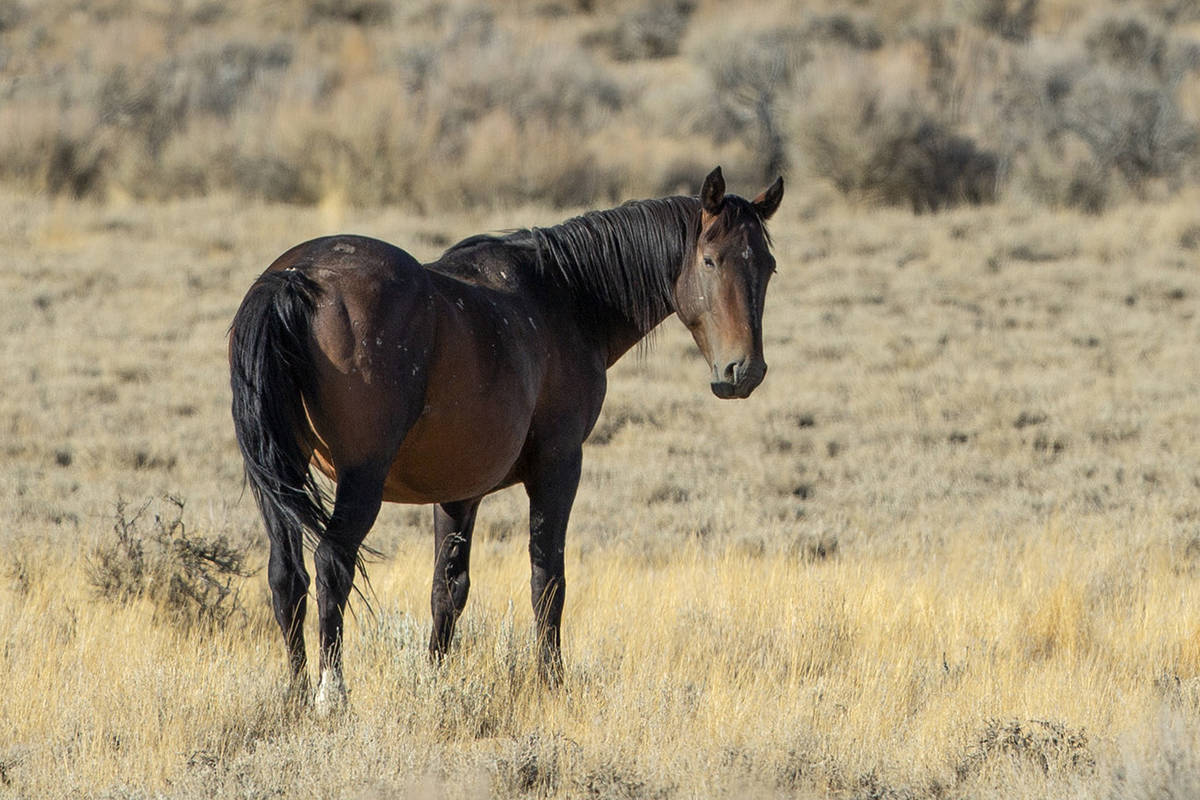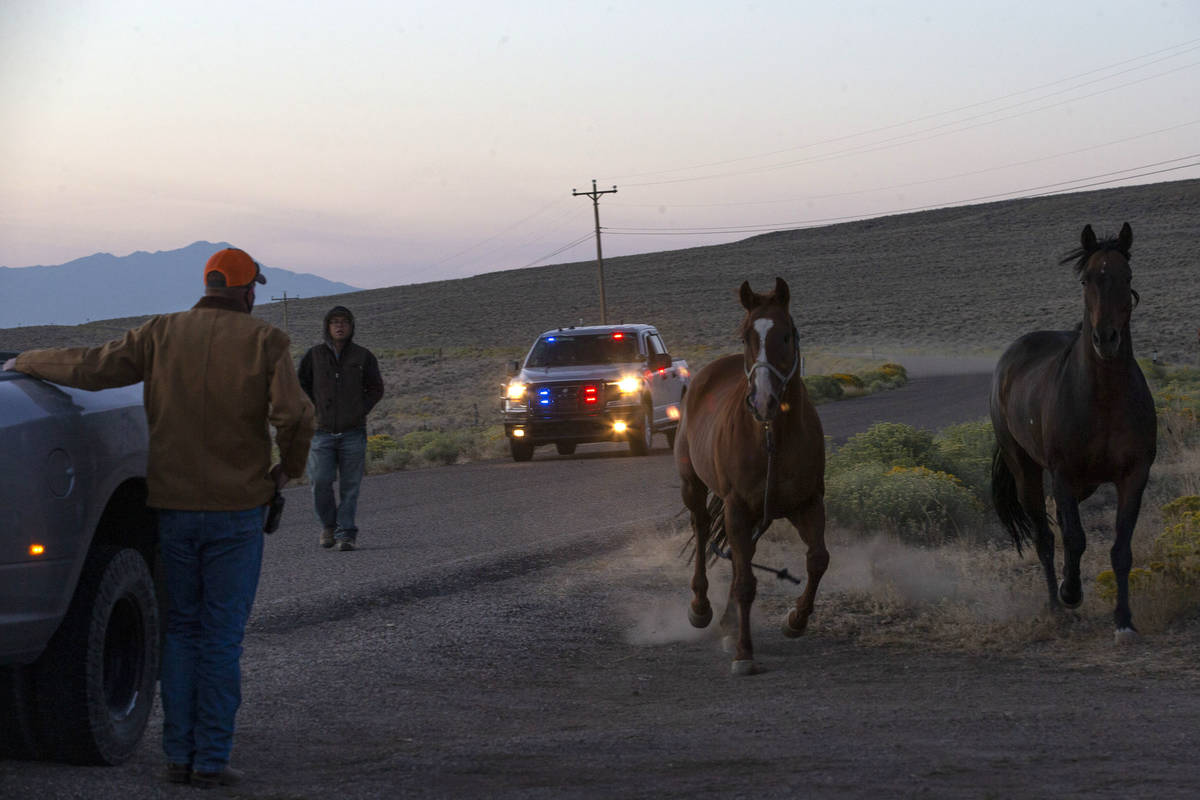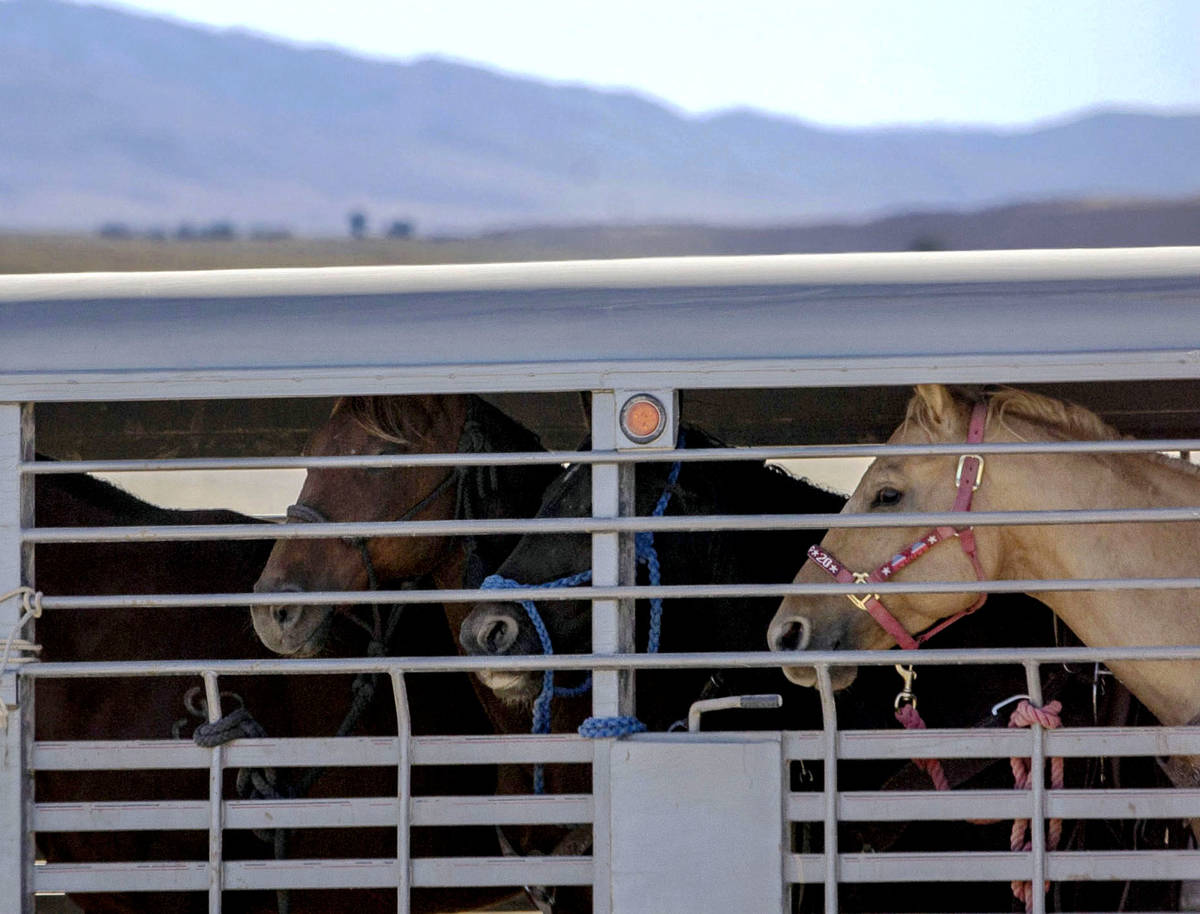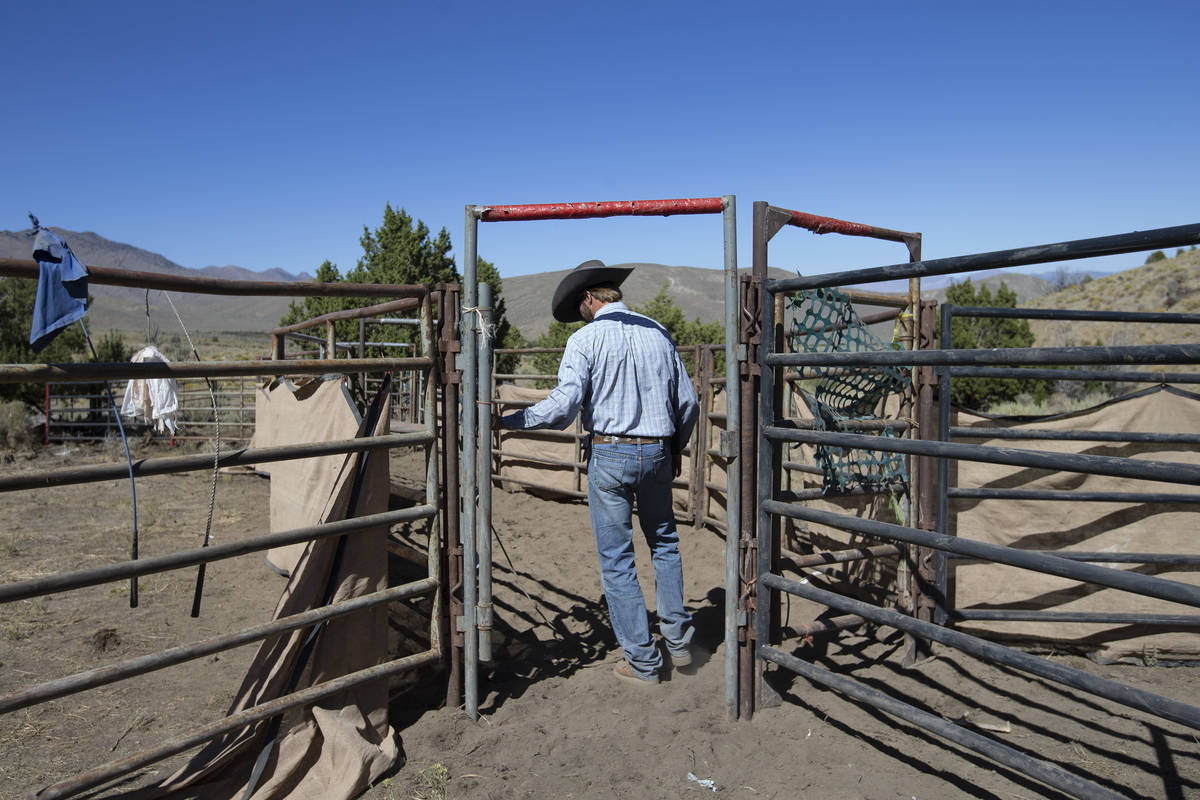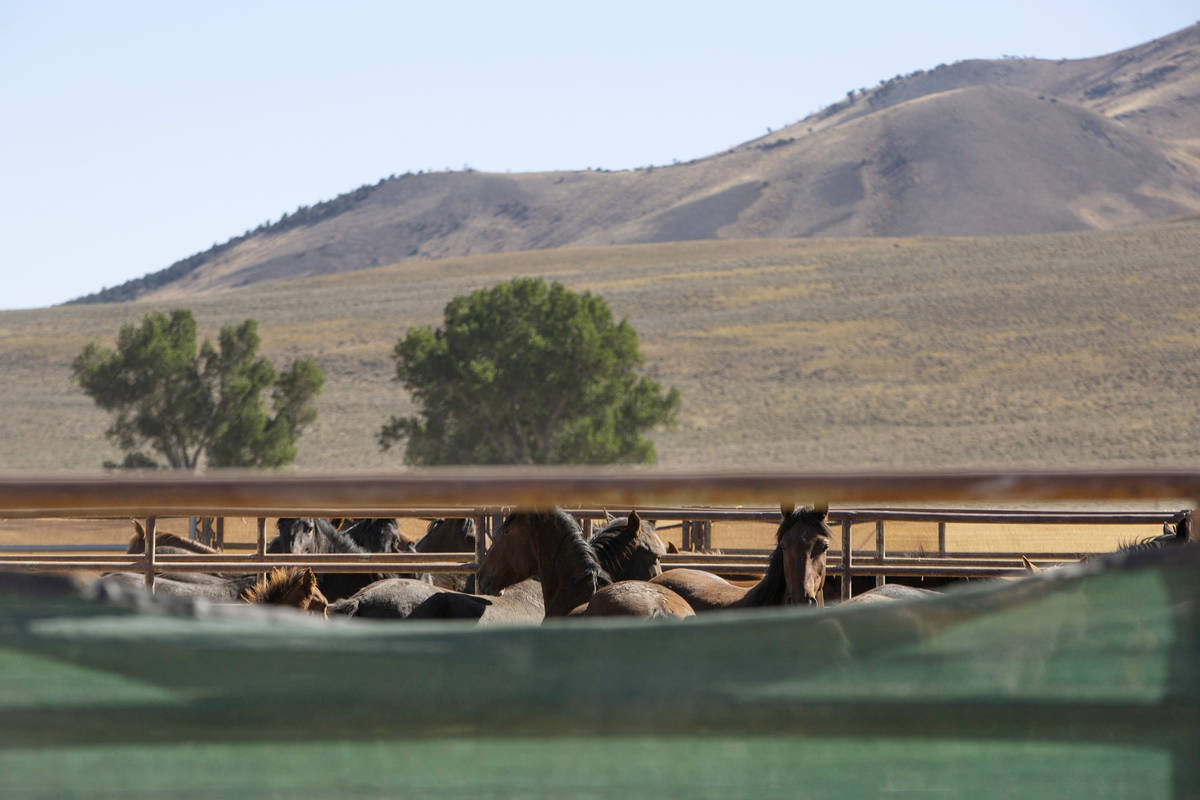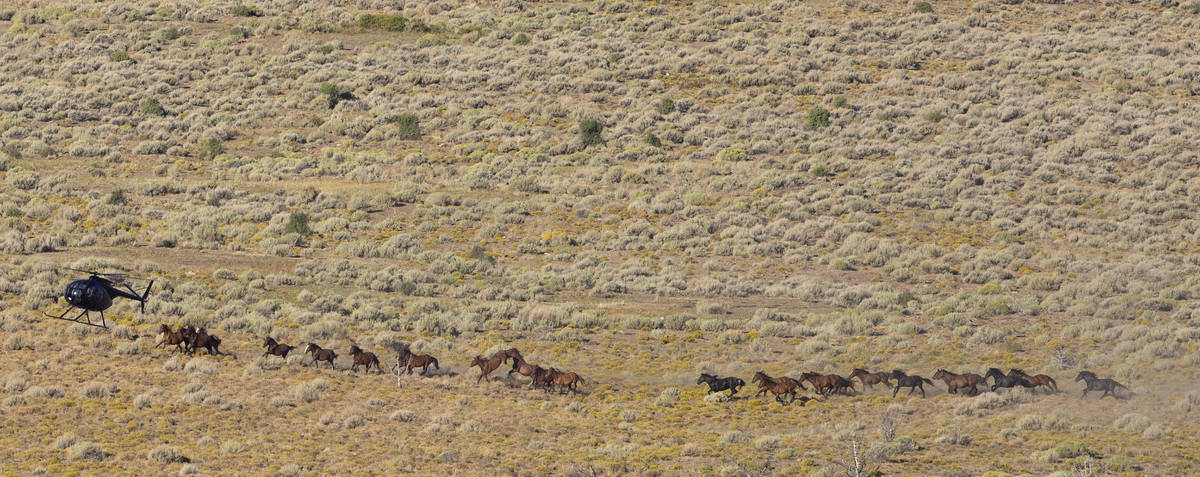Fearing slaughter of wild horses, lawmakers seek to halt adoption program
WASHINGTON — Outraged lawmakers are urging Interior Secretary Deb Haaland to halt a wild horse adoption program and conduct an investigation following a report that some of the adopted horses were subsequently sold to buyers and slaughtered for meat.
A wild horse rescue group also threatened last week to file a lawsuit in federal court to stop the Bureau of Land Management from continuing the program until safeguards and enforcement stop the illegal sales.
The Wild Horse and Burro Adoption Incentive Program under the BLM was designed to provide humane and safe shelter for wild-roaming animals rounded up to protect public lands for wildlife.
There are roughly 60,000 wild horses and burros on public lands in western and coastal states. Nevada is home to about 13,000 of the animals, according to BLM, which manages the herds on federal lands.
Congress passed a law in 1971 to protect the animals from slaughter for commercial purposes, and it is illegal to sell the adopted horses to buyers with the intent to do so.
But a recent report by the New York Times found that some of those adopting the horses sold them to buyers for slaughter, and that some of those who were determined to violate the law were allowed to adopt again.
Sen. Dianne Feinstein, D-Calif., and 30 House members, including Rep. Dina Titus, D-Nev., urged Haaland to halt the adoption program and conduct an investigation into the practice.
“Wild horses and burros are icons of the American West,” Titus and other lawmakers told Haaland in a June 2 letter. “They are protected under federal law and cherished by Americans across the country.”
Sold for meat
Under the program, the government paid $1,000 per horse for those qualified to adopt, but the Times report found some of those horses were later sold to buyers who sent them to slaughter.
The report’s findings were not new. Media outlets and lawmakers have reported similar slaughter of the adopted horses for illegal resale in recent years. The program also is closely watched by wild horse rescue advocate organizations.
Congress has prevented the sale of wild horses for slaughter for decades.
But the lawmakers said that once the animals were transferred to private ownership through sale or adoption under the BLM’s Wild Horse Adoption Incentive Program, the horses and burros are subject to resale and the lethal risk of being slaughtered.
“I strongly urge BLM to immediately suspend this program and conduct a thorough investigation to ensure federal funds are used to protect wild horses and burros against abuse,” Feinstein told Haaland.
Haaland did not immediately respond to lawmakers.
An Interior Department spokesman declined to comment on the congressional request to Haaland and whether the secretary has taken action on their demands.
Program designed to help
A BLM spokesman also declined to answer a question about action on the lawmakers’ request. But he said the agency “cares about the health, safety and well being of adopted animals.”
The program was set up to do just that.
BLM limits adopters to four animals within a 12-month period, requires ownership for at least 12 months from the adoption date and must allow compliance inspections.
Those requirements are to “ensure adopted animals go to good homes,” the BLM spokesman said.
Wild horse advocates, however, accuse the BLM of using the program to “launder” wild horses because the animals are too expensive for the government to house once removed from public lands.
And despite congressional requests this month, the program continues.
BLM has scheduled roundups through June of wild horses and burros in states where the proliferation of the animals threaten ecosystems with overgrazing.
The lack of response is prompting legal action by the American Wild Horse Campaign.
“We cannot sit idly by while the Biden administration remains silent as untold numbers of federally protected wild horses and burros are sent to slaughter through a program that is subsidized by our tax dollars,” said Suzanne Roy, the campaign’s executive director.
“We are prepared to take the battle over the BLM’s Adoption Incentive Program to federal court if the Interior Department continues to delay action to protect these iconic animals and abide by the congressional prohibition on wild horse and burro slaughter,” Roy said in a statement.
Haaland served as a congresswoman from New Mexico and was an advocate and backed legislation to protect wild horses and burros.
Her congressional record gives lawmakers and advocates confidence that the issue will be addressed.
Adoptions on the upswing
But despite reports that some horses have been illegally sold for slaughter, BLM officials point to the success of the adoption incentive program as one that protects horses, burros and wildlife by managing wild herds of animals grazing in fragile ecosystems.
More than 7,500 wild horses and burros have been adopted through the incentive program since its launch in 2019, according to BLM.
By increasing adoptions, the BLM said, it is better able to reduce widespread overpopulation of wild horse and burro herds, which has reached historic levels and continues to threaten the health of the animals, other wildlife and the land on which they depend.
But lawmakers say more safeguards and oversight of the program is needed. They question BLM’s enforcement of those violating the law and whether stiffer penalties should be assessed.
Until a complete investigation into the illegal slaughter of wild horses through the government-sponsored adoptions is completed, the program should be halted, they say.
Lawmakers also want a ban on horse slaughter that includes domestic animals and the export of horses for slaughter.
A bipartisan bill was filed this year by Rep. Jan Schakowsky, D-Ill., and Rep. Vern Buchanan, R-Fla. The Save America’s Forgotten Equines Act of 2021 would ban horse slaughter and export of horses, domestic or wild, for slaughter.
Agricultural and farming organizations have long fought against horse slaughter laws, arguing that farmers and ranchers should be allowed to recoup some money from work animals that suffer from injury or age and must be put down.
But the bipartisan bill does have support from horse racing groups like The Jockey Club and the National Thoroughbred Racing Association.
The sale of horse meat for human consumption in the United States is illegal due to chemicals and drugs ingested by the animals.
The meat is sold in foreign markets for commercial purposes and for products that include foods for pets and other animals.
There are roughly 60,000 wild horses roaming 31.6 million acres in Nevada, Arizona, California, New Mexico, Oregon, Utah and Wyoming, according to BLM.
Herds of wild horses are managed on barrier islands in Virginia and North Carolina.
“The best way to ensure that wild horses and burros will not be sent to slaughter is to ban horse slaughter entirely, including domestic horse slaughter and the export of horses for slaughter,” the lawmakers wrote Haaland.
Until a bill is passed banning slaughter, the lawmakers have asked Haaland to “take quick action to immediately suspend the Adoption Incentive Program.’’
Contact Gary Martin at gmartin@reviewjournal.com. Follow @garymartindc on Twitter.



